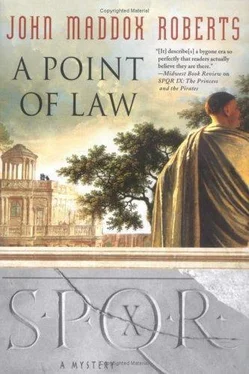John Roberts - A Point of Law
Здесь есть возможность читать онлайн «John Roberts - A Point of Law» весь текст электронной книги совершенно бесплатно (целиком полную версию без сокращений). В некоторых случаях можно слушать аудио, скачать через торрент в формате fb2 и присутствует краткое содержание. Год выпуска: 0101, ISBN: 0101, Издательство: St. Martin, Жанр: Исторический детектив, на английском языке. Описание произведения, (предисловие) а так же отзывы посетителей доступны на портале библиотеки ЛибКат.
- Название:A Point of Law
- Автор:
- Издательство:St. Martin
- Жанр:
- Год:0101
- ISBN:9780312337254
- Рейтинг книги:5 / 5. Голосов: 1
-
Избранное:Добавить в избранное
- Отзывы:
-
Ваша оценка:
- 100
- 1
- 2
- 3
- 4
- 5
A Point of Law: краткое содержание, описание и аннотация
Предлагаем к чтению аннотацию, описание, краткое содержание или предисловие (зависит от того, что написал сам автор книги «A Point of Law»). Если вы не нашли необходимую информацию о книге — напишите в комментариях, мы постараемся отыскать её.
A Point of Law — читать онлайн бесплатно полную книгу (весь текст) целиком
Ниже представлен текст книги, разбитый по страницам. Система сохранения места последней прочитанной страницы, позволяет с удобством читать онлайн бесплатно книгу «A Point of Law», без необходимости каждый раз заново искать на чём Вы остановились. Поставьте закладку, и сможете в любой момент перейти на страницу, на которой закончили чтение.
Интервал:
Закладка:
Then Hermes returned, having flown upon winged heels, as promised. He entered the peristyle with a bulky bundle over one shoulder and grinning like an African ape.
“I told you to bring back that scroll,” I told him, “not to sack the house.”
“I thought as long as I was taking one book, I might as well take them all.”
“There’s no stopping a born thief,” I said. “Actually, it isn’t such a bad idea. One of these others might be the key.”
Callista had her servants bring a large table into the peristyle and we spread Hermes’s loot out for inspection. There were about fifteen books altogether, some of them being sizable volumes requiring more than one scroll.
“Here’s the one you asked for,” Hermes said, taking the scroll from inside his tunic.
I unrolled it on the table, and we studied it first. Like most books of better quality, it was written on Alexandrian papyrus of the finest sort. I had seen papyrus being manufactured in Egypt, and it is a most exacting process. The versatile papyrus plant is split open and its pith is peeled away in long strips. A layer of strips is laid side-by-side, slightly overlapped. A second layer is laid atop the first, at right angles to it. This delicate mat is soaked, then pressed between planks with a great weight laid atop the upper plank. The resulting sheet, now bound together firmly by the natural glue in the plant, is placed in the sun to dry and bleach until it is almost white.
The best quality of papyrus is made from the largest plants, so that the fewest strips are needed for the upper surface, the one that is written on. On this surface the strips run in the same direction as the writing. No matter how well the papyrus is rubbed with pumice to obliterate irregularities, the joins between the strips always tend to catch the tip of the pen.
For books of the best sort, the papyrus is trimmed into sheets about ten inches by twelve. They may be written upon as individual sheets, then glued together along their shorter sides into long sheets suitable for binding into scrolls, or they can be purchased ready-made in the form of blank scrolls, ready to be written upon. Each method has advantages and disadvantages, but the latter is now the most common.
While I studied this, Julia and Callista looked over the other books. “I see Cicero here,” Julia said, “and Hortalus. Here’s a study of the Twelve Tables, together with commentaries and disputes concerning interpretation.”
“This,” said Callista, “seems to be a text on the use of the Sybilline Books in Roman law, written almost two hundred years ago by one Valgus of Lanuvium.”
“Single-minded bastard, wasn’t he?” I said. “It sounds like he was planning a Caesar-like conquest of the Roman legal profession.”
“Let me see this,” Callista said. She began to examine the opening sheets of the scroll. Its first sheet, in the usual fashion, gave the title, Certain Points of Law , and its author, who was indeed Aulus Sulpicius Galba. Apparently it was written before he became duumvir of Baiae, for he did not include this dignity among his honors.
It also contained the usual dedication: “This work I dedicate to the immortal gods and the muses, to my revered ancestors, and to my esteemed friends and patrons, Publius Fulvius Flaccus and Sextus Manilius.”
“Manilius!” I said. “I knew I’d trip over that name sooner or later.”
“It could be a coincidence,” Julia said. “It’s not an uncommon name.”
“When did you start believing in coincidence?” I asked her. “Fulvius and Manilius right here on the same page? That sounds like conspiracy to me. What do you want to bet these two are the fathers of the dead man and our young Tribune of the People?”
“I know better than to take a bet like that.”
Callista wasn’t interested in the dedication. She was scanning the text with great speed. She was one of those people who could read silently, a talent I have always admired.
“What are you looking for?” I asked her.
“The first sheet that contains every letter in the Latin alphabet. That one is most likely to be the key.”
She had lost me again. I rose and beckoned to Hermes. “Ladies, I will take my leave of you now.”
“I’ll stay here and help Callista with this,” Julia said. “What will you do now?”
“I’m going to find out what I can about young Manilius. Come, Hermes.”
We left them absorbed in their work, their heads together like two lifelong friends.
7
If any one place in Rome could be called the center of government in the old Republic, it would not be the Curia, which was just a place where the Senate met to argue and yell at each other. Nor was it the Septa on the Campus Martius where elections were held. At that time it was little more than a field with barriers to separate the people by tribes, and its informal name of “sheep-fold” was quite descriptive.
No, the true center of the Republic was the Tabularium on the lower slopes of the Capitoline Hill, where most of the important documents of the City and the Empire were stored. It was our one true government building. Otherwise, we continued our rustic, inconvenient old custom of locating civic functions and offices in temples.
We had the Treasury in Saturn’s, although money was coined in that of Juno Moneta. The Temple of Ceres housed the offices of the aediles; treaties and wills were kept in the Temple of Vesta. We declared war at the Temple of Bellona. We used the basilicas to hold courts, but they were used as much for markets and banks. Numerous minor temples housed lesser civic functions.
But the Archive kept the bulk of the records of government, many of them going back centuries. It was staffed by state-owned slaves and freedmen. In those days they were among the very few slaves owned directly by the state, unlike the vast slave bureaucracy that surrounds us now. They were very haughty, self-important slaves, too. The freedmen were even worse.
There was no real system or order to the place. It was not like the great Library at Alexandria where anyone who could read could walk straight to the wing where the work he desired was stored and find it within a few minutes. The Archive slaves simply kept everything in their memories, thus rendering themselves indispensable.
A bit of asking brought me to a warren presided over by a freed-man named Androcles. He was not happy to see me. They never were.
“Senator Metellus, is it?” he said, as if merely speaking my name were an intolerable imposition. “I thought the whole City had taken a holiday, all flocking out to the Campus to see the soldiers, as if they’ve never seen such a prodigy. Well, some people still have to work!”
“Excellent,” I said, “then you won’t mind doing a little work for me.”
“What?” He looked as if I had insulted his family, his homeland, and his national gods. “Have you any idea what is demanded of us here? Are you aware that Caesar’s new conquests have added not one but three, three , mind you, new provinces to the Empire?” His voice had risen to a shout.
“Yes, but-”
“There isn’t just to be a Province of Gaul,” he went on, ignoring me. “No, that’s not good enough for Caesar! There is to be a Province of Belgica, one of Aquitania, and one of Lugdunensis! Three brand-new provinces all at once! Oh, it’s easy to kill a flock of barbarians and conquer the place, but who do you think has to organize and administer that wilderness? With three complete sets of public servants to establish a government, arrange its finances, and keep its records? And we’re still getting Cyprus organized. Next thing you know, some fool is going to annex Egypt! Or Britannia!”
Читать дальшеИнтервал:
Закладка:
Похожие книги на «A Point of Law»
Представляем Вашему вниманию похожие книги на «A Point of Law» списком для выбора. Мы отобрали схожую по названию и смыслу литературу в надежде предоставить читателям больше вариантов отыскать новые, интересные, ещё непрочитанные произведения.
Обсуждение, отзывы о книге «A Point of Law» и просто собственные мнения читателей. Оставьте ваши комментарии, напишите, что Вы думаете о произведении, его смысле или главных героях. Укажите что конкретно понравилось, а что нет, и почему Вы так считаете.









